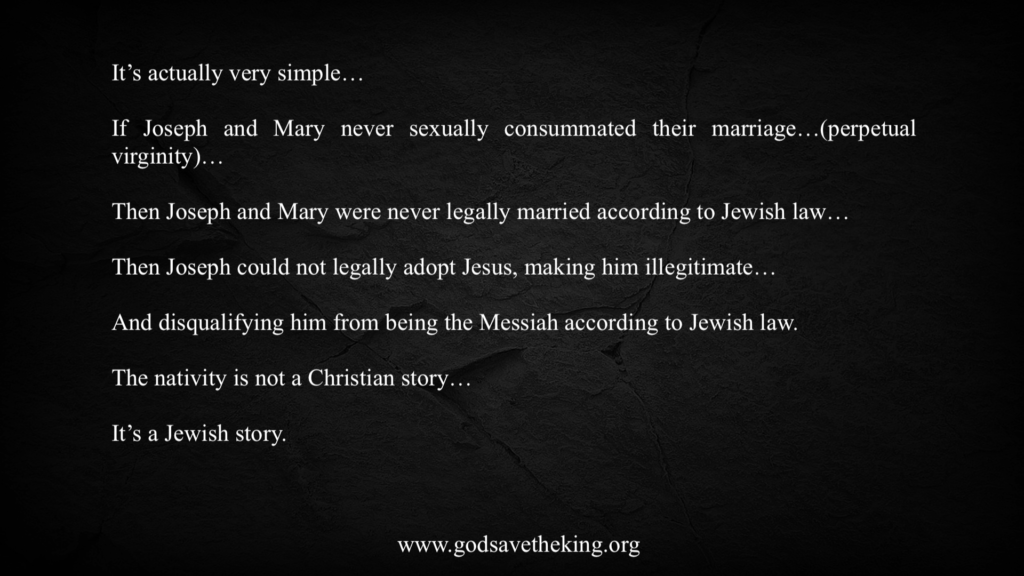
What does the doctrine of perpetual virginity have to do with the nativity? Quite a lot really. As we have discussed on many occasions, large portions of the traditional nativity story come from demonstrably false extra-biblical sources.
The very purpose of the Protoevangelium of James, for example, is to create a false narrative about both Joseph and Mary. It portrays Joseph as a feeble, insignificant old man in contrast to the exalted child Mary whose every step reeks of flawlessness. This is further used to manufacture extra-biblical traditions and dogmas–in particular the doctrine known as “perpetual virginity”. I will not attempt to fully explain this so-called doctrine here, other than to say that it claims not only a virgin birth (scripture teaches only a virgin conception), but that Mary remained a virgin for the rest of her life.
The so-called “Christian” view of celibacy held by the Roman Catholics and some other denominations is 180 degrees out of phase with the Jewish view. Jewish tradition views celibacy as unnatural. It is no accident that one of the Hebrew words for marriage, kiddushin, is derived from the Hebrew root KDS—meaning, to be holy.
“It is not he who marries who sins; the sinner is the unmarried man who does not fulfill the command ‘be holy’…”
Schneid, Marriage, 4. Goodman, Anthology, 303.
The Jewish view of marriage is that it fulfills the individual as a person and sanctifies their existence. To the Jewish mindset the commandment to be holy is a de facto commandment to get married (and have sexual relations).
The doctrine of perpetual virginity stretches the limits of credulity. First, we are told plainly that Jesus had siblings. Proponents of perpetual virginity attempt to explain this away by claiming that these were either his cousins, or Joseph’s children from a previous marriage. But scripture also describes Jesus as being the eldest—if these “siblings” were in reality his cousins, then him being the eldest would have no significance. If these “siblings” were Joseph’s children from a previous marriage, then Jesus couldn’t possibly be the eldest–you can’t have it both ways.
A less egregious but still mis-interpretation teaches that Joseph and Mary did have sexual relations, just not until after Jesus was born. In this case, Jesus’ siblings are legitimately Mary and Joseph’s children and therefore genuinely Jesus’ siblings.
The reason this matters is really quite simple. We have repeatedly stressed the fact that Joseph and Mary were Jewish. They would have had a Jewish wedding, and Jewish laws and customs would have been the rule of the day. In either case—Mary and Joseph never having sex (ever), or Mary and Joseph having sex only after Jesus was born—would mean their marriage was never legally consummated in the huppah, and tokens of virginity therefore were either never supplied, or “falsified.”
This in turn means that the labels husband and wife in Matthew 1:19–25 not only make no sense, but are a misrepresentation of the facts, and challenge the integrity of the scriptures. Both ideas, “no consummation” or “delayed consummation” are irreconcilable with Jewish tradition and scripture.
But to summarize and conclude, it is really quite simple. If Joseph and Mary never sexually consummated their marriage, then they were not legally married according to Jewish law. If Joseph and Mary were not legally married, then Joseph could not legally adopt Jesus. If Jesus was not legally adopted, then he was illegitimate. If he was illegitimate, then he would be disqualified from being the Messiah according to Jewish law.
The nativity is not a Christian story. It is a Jewish story.